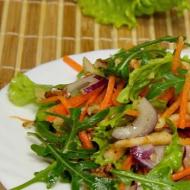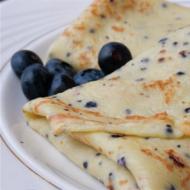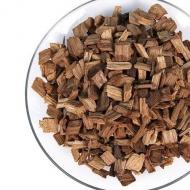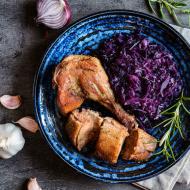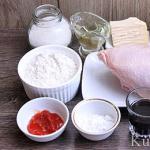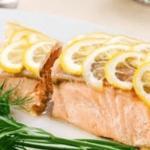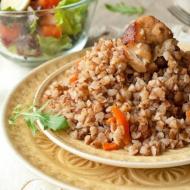
Seafood during pregnancy: oysters, mussels, shrimp. How to eat oysters correctly at home: when can you eat them and why? What seafood can pregnant women eat?
Seafood and: is it possible to eat caviar, shrimp and mussels
For our non-Mediterranean latitudes, seafood is still more of a delicacy and often ends up on holiday tables. But during the nine months of pregnancy, more than once you will want to please yourself with some delicacy. So let's talk about whether expectant mothers can eat caviar, shrimp and mussels?
Eating caviar during pregnancy
Many people refuse red caviar due to possible allergic reactions in a pregnant woman or baby. But this product is much less allergenic compared to cow's milk. Therefore, you can only focus on a specific organism and its reaction to this delicacy. Red caviar is a source of folic acid, which is so necessary for a growing baby and his developing nervous system. its composition saves the expectant mother from seizures, lecithin normalizes cholesterol, and protein goes to the structure of the organs and systems of the fetus. But in addition to the listed substances, vitamins, microelements, it contains caviar and a lot of salt, which should not be abused while pregnant. If the expectant mother has bad urine tests or high blood pressure, then you should completely avoid such food.
Mussels, shrimp and pregnancy
Shrimp and mussels are an excellent source of protein, minerals and other valuable substances. Due to the almost complete absence of fat, they are much healthier than animal meat. They are easily digestible, if, of course, you know when to stop. Eating a kilogram of seafood in one sitting will be difficult for an ordinary person. Therefore, it is better for pregnant women to stick to the norm of about 150 g a couple of times a week.
It is important to know that both shrimp and mussels must be cooked first and not eaten raw. Uncooked shellfish contain dangerous bacteria that can cause food poisoning. Also, before you indulge in seafood for dinner, be serious about purchasing it. It would be advisable to find out the place where they were caught. The fact is that mussels accumulate a certain amount of mercury (shrimp are safer in this regard). It is not dangerous for an ordinary person, but it can cause harm to a pregnant woman.
So, with the right choice of seafood, moderation in their consumption and attention to the reactions of the pregnant body, you can eat a little of them.
Delicacies of marine origin delight fans with their diversity. Supermarkets offer a wide range of products. Positive characteristics make it possible to cook seafood during pregnancy and add it to various dishes.
Peculiarities
During the process of bearing a baby, a woman builds her diet in such a way as to receive all the nutrients.
Can pregnant women eat seafood? They are an important component of nutrition. They contain protein, microelements, and polyunsaturated fatty acids. However, the amount of delicacies should be moderate, as they contain dioxins, pesticides and polychlorinated befinides. If ingested, they can harm the fetus.
Studies have shown that frequent consumption of seafood leads to the risk of developing birth defects and miscarriage. This does not mean that you need to give up consumption. You need to give up predatory fish, which, by eating small fish, can become a source of toxic elements. You cannot eat shark meat, swordfish, or king mackerel.

Despite the fact that sea fish contains useful substances, fish soup cannot be cooked. This is especially true for women who have high acidity. But you can bake it in the oven. Soup is recommended for low acidity to stimulate appetite and digest food.
Seafood has a large supply of microelements and proteins, so it can easily replace meat. They are especially useful for anemia. If you are prone to obesity, it is recommended to add seaweed to your diet.
Characteristics
Upon closer examination, it was revealed that shrimp take part in the low-calorie diet. This is a supply of protein, zinc, iodine, potassium, calcium, vitamins A and B. When consuming the product, the fetus develops normally, hair and nails are restored, the condition of the skin improves, and the risk of an allergic reaction is reduced. Do not forget that the presence of metals can negatively affect the body, so it is important to observe moderation.


It is important to know which seafood is safe for pregnant women:
- shrimps;
- squid;
- crabs;
- octopuses.
Seafood for pregnant women such as squid will help lower cholesterol. They are necessary for the normal functioning of the digestive system and increase appetite. Contains vitamins E, C, B1, B2, B6, phosphorus, zinc, iodine, potassium, iron. However, they cause allergies and food poisoning, so you need to choose only fresh products.


There is a lot of protein and a minimum of fat in crabs. They support the functioning of the cardiovascular system. The presence of vitamins B and PP helps with nervous disorders, improves emotional state, and lifts mood. At the same time, crab meat is a high-calorie product that can contain bacteria.
Use
Speaking about the fact that seafood is allowed for pregnant women, the opinion about tuna remains ambiguous. A pregnant woman needs to reduce her consumption of steaks. But you can prepare a salad with canned fish once a week.

Experts say that pregnant women are not prohibited from eating oysters; the product is beneficial for both mother and baby:
- low-calorie, helping to maintain weight;
- due to the presence of protein, it is considered a dietary product;
- is a natural source of zinc;
- supports heart function, as it contains magnesium, potassium and vitamin E.
Like any other delicacy, it should be in the diet in small quantities.

Preference is given to scallops, crayfish and crabs. Among the types of fish allowed are flounder, halibut, catfish, and sardine. There are several simple recipes with which you can cook tasty tilapia for pregnant women.
A proper diet is a combination of different types of fish and seafood no more than three times a week. They must be thoroughly washed and stewed well to minimize the amount of harmful substances.
In any case, seafood should be present in the diet during pregnancy. At this time, vitamins, omega acids, proteins, and minerals are needed. And their content allows you to maintain the body in good condition.
The positive effect of the components on the body of mother and baby has been proven, if they are not abused. It is better to consult a specialist, visit a nutritionist. They will select products that will keep you healthy and help avoid an allergic reaction.
Many girls are drawn to different foods: vegetables, fruits, sweets, or, conversely, spicy dishes. However, some people cannot live without oysters. From this article you will learn whether these seafood products are ok, all about their benefits and harms.
What harm is there for pregnant women?
The delicacy is mainly served raw in many restaurants. It is sprinkled with lemon juice or hot sauces and eaten. Such a delicacy can lead to food poisoning, since during pregnancy the woman has a weak immune system.
Important! Undercooked oysters have an unpleasant taste and can cause gastrointestinal problems.
However, you can consume this seafood, but only in boiled form. Be careful, as a dish that is not fully cooked can cause neurological problems or... Another disadvantage of the delicacy is that after eating oysters, the mother may become sensitive to this product, but this only happens if the mother has an individual intolerance. In addition to pregnant women, the product is contraindicated for people with gout, gastrointestinal diseases, etc.
What about the benefits: is there any?
The delicacy contains a large amount of (, B, D,) and minerals (phosphorus, cobalt, zinc, manganese and others), and it is useful for mother and baby. The product is suitable for girls who want to preserve theirs after childbirth, because 12 oysters contain only 200 kcal. 
Did you know? The largest oyster was 38 cm long.
It also contains a large amount of protein, which is necessary in the diet. The delicacy is good for the heart, as it contains potassium and helps reduce inflammation and the risk of cardiovascular diseases. Seafood will also help strengthen the immune system, improve brain function and reduce the risk of cancer. In addition, the delicacy improves the functions of the kidneys, liver, nails, and also slows down the aging process.
Precautionary measures
Oysters are best consumed during pregnancy in the second trimester. However, do not eat them raw. In the first and third trimester, it is better to exclude the product altogether, since during this period the toxic substances of the delicacy can negatively affect. Check their readiness before use. If they are firm, it means they are cooked correctly. It is advisable to consume the prepared delicacy on the same day; it is better not to leave it for the next day. 
Important! Before using the product, consult your doctor.
How to cook, what can be done and what to combine with
The product can be prepared in different ways: on the grill, steamed, in a slow cooker, in a saucepan, in a frying pan. The main rule is not to eat raw oysters when
All expectant mothers repeatedly listen to lectures on the importance of a healthy and balanced diet. And it’s hard to argue with this: the developing fetus needs a huge amount of microelements, vitamins, enzymes and other “building materials”. And their lack can subsequently affect your health throughout your life.
And as a source of animal protein, as well as a huge amount of valuable microelements (iodine, zinc, calcium, phosphorus and others), seafood is of great importance. They contain rare amino acids, as well as many Omega-3 acids. It is not for nothing that peoples who regularly eat seafood live very long and enjoy enviable health.
Thus, the answer to the question whether seafood can be eaten by pregnant women is generally affirmative. That is, yes, it is possible, even necessary. This is confirmed by numerous studies by American, Japanese, British and other scientists from all over the world.
Another thing is that there are some moments here. In particular, seafood during early pregnancy is allowed, just as in late pregnancy. There is no strict reference to specific periods, although scientists note that it is most beneficial to include such foods in the diet in the 2nd trimester.
What to consider?
River fish is highly undesirable
About sea fish
And yet, fish in the sea (ocean) often accumulate mercury. Actually, cases of seafood poisoning during pregnancy are often associated with this. To avoid such a risk, avoid those species that live a long time (a popular one is tuna, for example), because over a longer lifespan, fish are able to accumulate more mercury in their bodies.
Marine predators are more dangerous for us, because each of them fed on other fish, which means they received everything that they managed to accumulate in the ocean. Thus, the concentration of many harmful substances can be an order of magnitude higher. The highest levels of mercury are found in shark, king mackerel, yellowfin and bigeye tuna, swordfish, marlin, catfish and Atlantic roughy. A complete list can be easily found on specialized websites.
The highest levels of mercury are found in shark, king mackerel, yellowfin and bigeye tuna, swordfish, marlin, catfish and Atlantic roughy.
What then is possible? Experts recommend focusing on varieties that do not tend to accumulate mercury. Thus, oily fish during pregnancy, anchovies, pollock, salmon, haddock, catfish, whiting, and tilapia are recommended. They are usually consumed 2 times a week.
But keep in mind that not everyone thinks so. Some doctors generally believe that smoked fish is extremely undesirable during pregnancy. And this is due not only to the product itself, but also to the dubiousness of the processing method. The fact is that instead of normal smoking, today some irresponsible manufacturers simply treat carcasses with special chemical compounds, giving them the desired color and aroma. Need I say how “useful” this is?
Doctors believe that smoked fish is extremely undesirable during pregnancy.
About processing methods
Secondly, nutritionists generally believe that the best option is steaming or baking, as well as boiling, although not in all cases. Frying periodically leads to the formation of carcinogens. Of course, if from time to time you treat yourself to something with a crispy crust, then there will be nothing wrong. But you shouldn’t get too carried away.
The best option is steaming or baking, as well as boiling, although not in all cases.
Salted fish during pregnancy also raises questions: if there is little mineral, then the product is close to raw, with all the ensuing consequences and risks. With intensive sodium chloride treatment, other problems arise: too much salt in the body leads to fluid accumulation, which is harmful to expectant mothers.
Is dried fish allowed during pregnancy or should you avoid it?
Such foods contain a lot of salt, which increases the load on the kidneys and can cause swelling. If you already have such a problem, then at least for this reason it is better to refuse the treat. On the other hand, if the kidneys are working normally, but you want just a little, then there is nothing wrong with a relatively small amount of salt.
If the fish is of high quality and has undergone heat treatment during drying, then there is no risk. So here the question arises of choosing a manufacturer you can trust. But if you have doubts, but still have a terrible urge to eat, try to process it just in case. This will provide additional guarantees.
During pregnancy, many people really like dried fish. Certain sea varieties, if there is no swelling, are completely allowed in small quantities. But in general, it's best to abstain as there is no processing involved to ensure the product's safety.
What fish is good for pregnancy?
If, after all the warnings, you are tempted to give up seafood altogether, do not give in to it. This food, as mentioned above, is very healthy. So, during pregnancy, red fish often helps normalize blood pressure and improve appetite. Including it in a regular diet helps prevent headaches and solve problems with the functioning of the thyroid gland.
And don't forget that it doesn't end with the fish. There is a huge amount of other seafood: crabs, crayfish, shrimp, scallops, squid, etc. The only thing that causes concern is oysters, because they are safe only in an exceptionally fresh state, and as such they pose a threat even to a completely healthy person.
It is worth paying close attention to mussels. These mollusks themselves are a kind of orderlies of the sea. They pass through a huge amount of dirty water, cleaning the world's oceans. If mussels grow in a clean reservoir (or are specially bred), then everything is in order. Otherwise, they may contain heavy metals and many other harmful substances. And no one should eat such shellfish, especially not a pregnant woman.
Allergy issue
You may be allergic to shrimp, oysters, mussels, and some types of fish. Moreover, such a reaction of the body often develops or first appears during pregnancy. Therefore, if you have never tried this or that seafood before, you should first take a small piece.
In general, it is advisable to limit yourself to a moderate amount during your first contact during pregnancy with fish or shrimp and carefully observe how exactly the body reacts. If you don’t feel nauseous, a rash or cough doesn’t appear, your eyes don’t start to water, in a word, there are no typical signs of an allergy, then next time you can eat a larger portion.
How much are you allowed to eat?
Pregnant women worry about everything: is it possible, how much, how often? The average norm is 2 times a week, approximately 340 grams in total. For proper nutrition, try not to deviate from this volume to a lesser extent.
And keep in mind that we are talking about average indicators. Nobody is saying that you should seriously get a scale. So a slight deviation here is quite acceptable. The main thing is that it is not critical.
This amount may seem small to some, but keep in mind that pregnant women need a varied, nutritious diet. Which should include meat, poultry, offal (separately), mushrooms, vegetables, fruits, nuts, sour milk, herbs, cereals and much more. If all of the above are alternated with each other, then the restriction will not be particularly felt.



